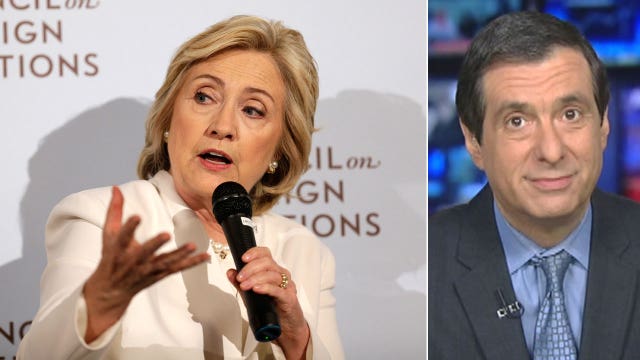Kurtz: Hillary Clinton's terror dilemma
'Media Buzz' host reacts to former secretary of state's foreign policy address at CFR
Hillary Clinton gave her commander-in-chief speech yesterday.
With the Republican candidates uniformly slamming President Obama for an anemic response to ISIS, his former secretary of State decided to lay down her own plan. And while Clinton didn’t overtly criticize her former boss, she proposed a somewhat more aggressive approach—a reminder that she is a more hawkish Democrat than the incumbent.
Her situation is not unlike that of Hubert Humphrey, running as LBJ’s vice president in 1968 and having to gingerly discuss a Vietnam War that was not going well without openly breaking with the White House. The Paris attacks have dramatically shifted the media's center of gravity in this campaign.
The main headline from Clinton’s appearance at New York’s Council on Foreign Relations, carried live on MSNBC, is that she doesn’t want to send U.S. ground troops to Syria—even if there is another attack on American soil. In that, she is in sync with Obama—and at odds with such Republicans as Jeb Bush, who this week explicitly called for using ground forces against ISIS.
Indeed, the RNC wasted little time in calling Clinton “the architect of the failed Obama foreign policy” who has “largely doubled down on the existing Obama strategy.”
The other headline was her criticism of the Republicans—without citing the party by name—on Syrian refugees. Again, Hillary’s stance put her in lockstep with Obama.
“Turning away orphans, applying a religious test, discriminating against Muslims, slamming the door on every single Syrian refugee--is just not who we are. We’re better than that,” she said.
But in calling for America to enforce a no-fly zone in Syria, Clinton is pushing a step that Obama is resisting. And by calling on Congress to quickly authorize the use of military force, she is challenging her former colleagues to do what they refused to do when the president asked for such authority in 2013.
In pure political terms, Clinton did not want to cede the stage to Donald Trump and other Republican candidates, who have been blitzing the airwaves with calls for more aggressive action against ISIS and halting the flow of Syrian refugees to this country.
Unlike every other presidential contender, Clinton ran the State Department for four years and dealt with terror issues—as is all too apparent from the failure in Benghazi. She made a point of threading her discursive speech with references to her Foggy Bottom tenure, such as building up “a unit of communications specialists fluent in Urdu, Arabic, Somali, and other languages to do battle with extremists online.” And: “We created the Global Counterterrorism Forum, which now brings together nearly 30 countries, many from the Muslim world.”
She was careful to observe diplomatic niceties, such as saying “the U.N. Security Council should update its terrorism sanctions.”
Clinton also dug in on the linguistic battle. “Islam itself is not our adversary,” she insisted. “Muslims are peaceful and tolerant people and have nothing whatsoever to do with terrorism.” She declared that using the phrase “radical Islamic terrorism,” which most Repubicans favor, “is not just a distraction, it gives these criminals, these murderers, more standing than they deserve and it actually plays into their hands by alienating partners we need by our side.”
With the Paris massacre shining a media spotlight on fear and frustration, Clinton’s speech was not intended as a stirring call to arms. It was an effort to show she’s serious about terrorism—but sensitive to refugees—as those subjects dominate the campaign agenda.













































